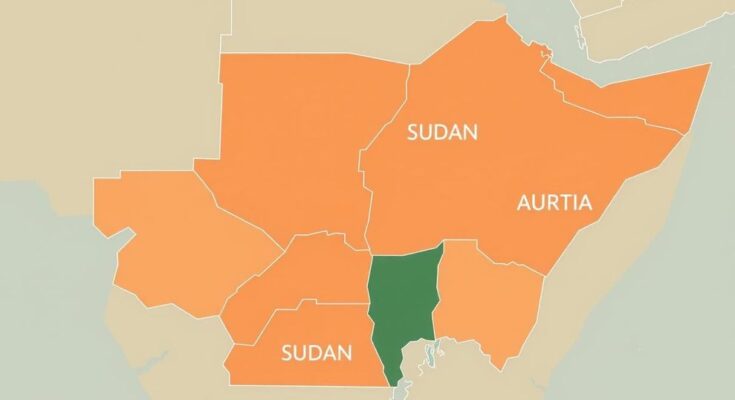The RSF’s establishment of a self-identified government threatens Sudan’s stability and exacerbates its territorial divisions. This move reflects deep internal fractures following the RSF’s break from the SAF, complicating efforts for democracy. Faced with international concern and rising military advances from the SAF, Sudan’s future risks becoming a prolonged conflict without manageable resolution.
On February 23, 2023, Sudan’s paramilitary force, the Rapid Support Forces (RSF), proclaimed the establishment of a self-identified ‘Government of Peace and Unity.’ Notoriously linked with war crimes since the conflict began in April 2023, the RSF’s announcement serves to exacerbate Sudan’s turmoil and poses a threat to the nation’s territorial integrity, contributing to an ongoing de facto partition.
The formation of this government highlights the significant internal fractures within Sudan, stemming from the RSF’s divergence from the Sudanese Armed Forces (SAF). After the 2019 revolution, the SAF briefly shared power with civilian groups, yet escalating violence has shattered hopes for democracy. This recent declaration signifies a formal break with the SAF as the RSF attempts to establish governance in regions under its control, predominantly in western Sudan.
Signed in Nairobi, Kenya, the RSF’s charter emphasizes the establishment of a secular, democratic state that respects diverse identities. However, analysts perceive this as an effort to obscure the RSF’s history of atrocities amid human rights violations and accusations of genocide. The RSF’s claims of governing legitimacy are met with skepticism, as experts warn this initiative may further entrench Sudan’s political and territorial divisions.
The RSF’s recent declaration appears to deepen the existing rift in Sudan rather than facilitate reconciliation. Despite suggestions that Sudan may be following Libya’s path toward civil strife, analysts argue that each nation has distinct dynamics. The SAF has made advances in retaking RSF-held territory and condemned the rival government, which may solidify the current divisions and humanitarian crises in Sudan’s landscape.
International response has been cautionary, with the United Nations warning that the creation of a parallel government could foster further fragmentation. Several Middle Eastern nations condemned the RSF’s actions as detrimental to Sudan’s stability. The conflict also garners attention from global powers such as Iran, China, and Turkey, which have supplied arms to the SAF, while the UAE’s financial connections to the RSF raise concerns regarding foreign involvement in Sudan’s crises.
The international community has remained largely passive in its approach to Sudan, and failure to address the escalating tensions risks solidifying a de facto partition of the country. Without intervention, Sudan may find itself facing a prolonged civil conflict, leading to catastrophic consequences for its civilian population.
In summary, the RSF’s declaration of a rival government is a critical development in Sudan’s ongoing conflict that intensifies national divisions and threatens territorial integrity. The move is perceived as an effort to legitimize the RSF amid widespread accusations of war crimes. With the SAF making military gains and the international community expressing concern, Sudan’s political future remains precarious, potentially transitioning from a crisis to an entrenched division without significant intervention.
Original Source: www.newarab.com




